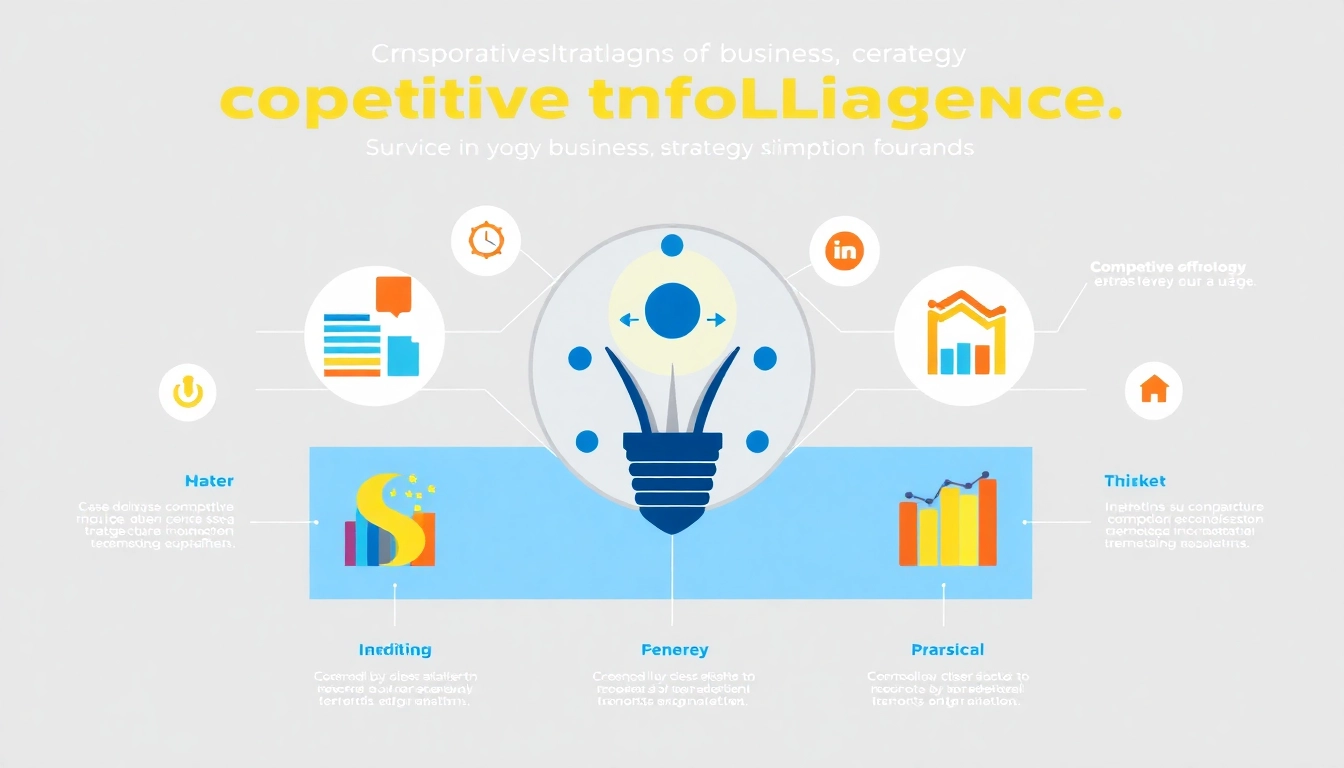
Understanding Competitive Intelligence Services
What Are Competitive Intelligence Services?
Competitive intelligence (CI) services encompass a systematic and structured methodology for collecting, analyzing, and interpreting data regarding competitors, market trends, and consumer behaviors. These services are vital for businesses aiming to gain a competitive edge in their industries by providing insights that help inform strategic decision-making. Essentially, competitive intelligence services act as a radar, detecting shifts in the market landscape and allowing organizations to navigate their course with greater confidence.
The Role of Competitive Intelligence in Business Growth
As companies strive to outperform their competitors in an increasingly saturated market, the role of competitive intelligence becomes critical. Businesses harness CI to identify weaknesses in their competitors, recognize market opportunities, and pivot their strategies accordingly. By analyzing data from various sources—ranging from public financial reports to social media chatter—companies can cultivate a robust understanding of the competitive terrain. This not only aids in formulating effective marketing strategies but also supports product development, pricing decisions, and operational enhancements.
Key Components of Effective Competitive Intelligence
Effective competitive intelligence is multifaceted. It generally includes:
- Data Collection: Gathering information from both primary sources (like interviews and surveys) and secondary sources (such as academic papers, business journals, and online databases).
- Data Analysis: Transforming raw data into actionable insights through analytical tools and methodologies, including SWOT analysis, trend analysis, and competitor benchmarking.
- Dissemination: Sharing insights with relevant stakeholders within the organization to ensure that all team members are informed and able to act on the intelligence provided.
- Monitoring: Continuously tracking competitors and market trends to refine strategies and maintain a proactive stance toward market changes.
Benefits of Utilizing Competitive Intelligence Services
Identifying Market Opportunities
One of the most significant advantages of utilizing competitive intelligence services is the ability to detect market opportunities that may otherwise go unnoticed. Through thorough analysis and research, companies can uncover gaps in the market, unmet consumer needs, or emerging trends that can be leveraged for competitive advantage. For instance, if a CI analysis reveals an increasing demand for eco-friendly products, a business can consider expanding its offerings to include sustainable alternatives.
Minimizing Risks through Research
Risk management is a pivotal aspect of business strategy; understanding the competitive landscape enables organizations to foresee potential challenges. Competitive intelligence services can highlight industry trends that indicate a downturn, new regulations that could affect operations, or competitive threats that need to be addressed. By being aware of these risks early on, companies can implement strategies to mitigate potential negative impacts before they occur.
Enhancing Strategic Decision-Making
Strategic decision-making often hinges on the availability of accurate and relevant data. Competitive intelligence services provide organizations with valuable insights that lead to better decision-making processes. Businesses can test their assumptions, validate market theories, and make informed choices about investments, partnerships, and product launches based on CI findings. This data-driven approach significantly decreases the uncertainty that typically accompanies major business decisions.
How to Choose the Right Competitive Intelligence Service
Assessing Service Providers
With numerous providers offering competitive intelligence services, selecting the right one can be daunting. It’s essential to consider their expertise in your specific industry, as well as their methodologies and technologies employed for data sourcing and analysis. Look for service providers that offer case studies or testimonials showcasing their past successes in delivering relevant insights.
Evaluating Key Features and Offerings
When choosing a competitive intelligence service, assess the range of features they offer. Ideal services should include diverse data sources, user-friendly dashboards for data visualization, and custom reporting that meets your business’s specific needs. Additionally, ensure that they provide regular updates and ongoing support, as the competitive landscape is continuously evolving.
Understanding Pricing Models
Pricing structures for competitive intelligence services can vary widely. Some providers operate on a subscription basis, while others may charge per project or based on deliverable metrics. It’s important to clarify what is included in the price and whether there are any hidden fees. Careful consideration of budget constraints against the value provided will support a more informed decision.
Top Competitive Intelligence Tools and Software
Comparative Analysis of Popular Tools
There are numerous competitive intelligence tools available that can streamline the process of gathering and analyzing competitor data. Popular tools like Owler and SimilarWeb provide insights into competitor revenue, web traffic, and market positioning. These tools differ in functionality; for example, while SimilarWeb focuses predominantly on web analytics, Owler provides business news updates, making them suitable for different strategic needs.
Integrating Tools with Business Processes
Integrating competitive intelligence tools with existing business processes is crucial for maximizing their value. Companies should ensure that insights derived from CI tools are channeled into existing strategies and operational workflows. This might involve setting up regular stakeholder meetings to review intelligence findings and adapt business strategies accordingly. Integration is not merely a technical arrangement; it requires a cultural shift within the organization to embrace data-driven decision-making.
Custom Solutions for Unique Needs
Sometimes, off-the-shelf tools may not fully address the unique requirements of a business. In such instances, custom solutions are an ideal path forward. These may involve bespoke analytical frameworks or tailored data collection strategies. Engaging with a CI service provider that can offer tailored solutions ensures that the business’s specific challenges and goals are addressed directly and effectively.
Measuring the Impact of Competitive Intelligence
Key Performance Indicators for Success
To evaluate the effectiveness of competitive intelligence services, organizations should define clear Key Performance Indicators (KPIs) that align with their strategic objectives. Common KPIs include:
- Market share growth
- Improvement in sales performance correlated with CI initiatives
- Reduced time in decision-making processes
- Increased customer satisfaction and loyalty metrics
Case Studies of Effective Implementation
Examining case studies of businesses that have successfully implemented competitive intelligence strategies can yield valuable insights. For example, a global telecommunications firm utilized CI services to identify a significant drop in customer satisfaction due to emerging competitors offering superior features. By redirecting its product development efforts to address these noted deficiencies, the firm was able to regain market share, showcasing the power of intelligent data application.
Continuous Improvement in Competitive Strategies
Competitive intelligence is not a one-off task; it requires ongoing refinement and adjustment. Organizations should periodically review their CI strategies to ensure they remain relevant and effective in the current market landscape. Methods such as regular feedback loops with stakeholders and revisiting objectives based on market evolution can reinforce a culture of continuous improvement. This adaptability will ensure that competitive intelligence remains a relevant and powerful tool in a company’s strategic arsenal.






